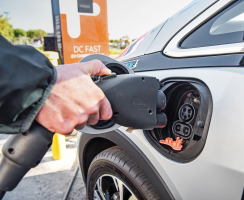Canadian Bolt Owners Already Had Winter Range Anxiety, a Recent Software Update Only Made it Worse

The combination of cold-weather and a recent software update is diminishing the Chevy Bolt's range by an estimated 33% according to a new class-action lawsuit. That has sparked some serious range anxiety for Canadian owners. Most EV owners are aware that cold weather is going to slow the battery down a bit, but that problem has been compounded by GM's decision to limit the Bolt's charging capacity to 90%.
A Bit More ∞
- That limitation is temporarily in place to prevent the car from catching on fire. Seems like a good idea. Although I guess if you ended up stranded on the side of a cold Canadian highway a Bolt bonfire isn't the worst thing that could happen.
- This isn't the only range anxiety lawsuit to pop up after that decision. And with cold-weather swooping all the way down to Texas I wouldn't be surprised if we see more like it.
Want to Learn More?
Bolt Batteries Could Catch on Fire As They Charged Near 100%
GM believes new software updates will allow Bolt owners to fully charge their batteries once again. Owners were asked to temporarily limit their battery's charging capacity to stop defective cells from sparking a flame and make the EV extra

Related Chevrolet Generations
At least one model year in these 1 generations have a relationship to this story.
We track this because a generation is just a group of model years where very little changes from year-to-year. Chances are owners throughout these generation will want to know about this news. Click on a generation for more information.
1st Generation Bolt
- Years
- 2017–2021
- Reliability
- 12th out of 80
- PainRank™
- 1.09
- Complaints
- 7